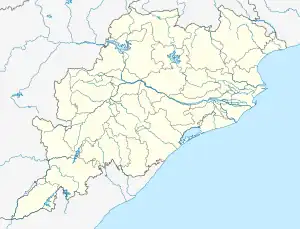Kapilasa Wildlife Sanctuary
Kapilasa Wildlife Sanctuary or Kapilash Wildlife Sanctuary is situated in Dhenkanal district of Odisha state in India . It is spread across 125.5 km2 (48 sq mi) in the Chota Nagpur Plateau region. It is classified as an Eastern Highlands moist deciduous forests ecoregion.
| Kapilasa Wildlife Sanctuary | |
|---|---|
| କପିଳାଷ ବନ୍ୟଜନ୍ତୁ ସଂରକ୍ଷଣାଳୟ | |
IUCN category IV (habitat/species management area) | |
 Location of Kapilasa Wildlife Sanctuary in Odisha | |
| Nearest city | Dhenkanal |
| Coordinates | 20.7073695°N 85.8017064°E |
| Area | 125.5 kilometres (78.0 mi) |
| Designated | April 2, 2011[1] |
| Governing body | Ministry of Forest and Environment, Government of Odisha |
About
The wildlife sanctuary got designation on 2 April 2011.[2][3] It was declared Eco-Sensitive Zone (ESZ) by Ministry of Environment, Forest and Climate Change through draft gazette on 4 July 2014.[4] The extended ESZ area of sanctuary is now 393.87 square kilometres (152.07 sq mi). The ESZ zone impacts total 36 adjoining villages.[5]
Tourism
The Government of Odisha declared its interest in developing Kapilasa into a tourist hub in 2016 as part of its wider scheme of developing natural resources of the state.[6]
Ecotourism
Eco-cottages and boating facilities will be the first to be introduced as part of the ecotourism drive according to General chief conservator of forests in 2016.[6]
How to reach
The forest reserve can be reached from Cuttack district or Dhenkanal district via surface transport. It is easier to access the sanctuary from Dhenkanal town due to ease of railroad and road transport connectivity from this town.
Flora and fauna
Sal, is the dominant species of trees in this sanctuary.[5][7] Other notable flora include Amla, Asan, Bela, Bija, Dhaura, Gmabhari, Jamu, Kadamba, Kanchan, Kangara, Karanja, Kasi, Kendu, Kurum, Kusum, Mahul, Mango, Mundi, Phasi, Sidha, Simul and Teak.
Traces of Lamiaceae were found in the core area of sanctuary.[8]
Important fauna include Asian elephant, Bengal fox, Golden jackal, Gray langur, Indian crested porcupine, Indian giant squirrel,[9] Indian peafowl, Sambar deer, Striped hyena, Wild boar,[5][7] and various varieties of birds, lizards etc.
Biological Protection
The sanctuary has been a prime subject of multiple protests by wildlife protection groups due to heavy industrialization and government policies that are threatening the biodiversity and ecosystem.[10][11][12][13][14]
References
- "Sanctuaries in Odisha - A quick glance". odishawildlife.org. Retrieved 2 January 2017.
- Negi, S.S. (2002). Handbook of national parks, wildlife sanctuaries, and biosphere reserves in India (3rd rev. ed.). New Delhi: Indus Pub. Co. p. 144. ISBN 8173871280.
- Negi, S.S. (1991). Handbook of national parks, sanctuaries and biosphere reserves in India (1. publ. ed.). New Delhi: Indus Publ. Co. p. 155. ISBN 8185182590.
- "Centre notifies Eco-sensitive Zone around Kapilash Wildlife Sanctuary". odishasuntimes.com. 11 August 2015.
- "Draft Notification of the Kapilash Wildlife Sanctuary - Declaration as Eco-sensitive Zone in the State of Odisha". Ministry of Environment, Forest and Climate Change. Retrieved 2 January 2017.
- Ramanath V, Riyan (14 January 2016). "Kapilash sanctuary to be made tourist hub". The Times of India.
- Negi, S.S. (1993). Biodiversity and its conservation in India. New Delhi: Indus. p. 243. ISBN 8185182884.
- Misra, R. C.; Das, G. (19 April 2015). "Ocimum kilimandscharicum Guerke (Lamiaceae): A New Distributional Record for Peninsular India with Focus on its Economic Potential". Proceedings of the National Academy of Sciences, India Section B: Biological Sciences. 86 (4): 795–803. doi:10.1007/s40011-015-0526-9.
- "Guardians Of Tomorrow – The Sanctuary Wildlife Awards 2015". Sanctuary Asia. XXXIV (6). 6 December 2014.
- Shukla, Avay (16 June 2015). "Can we trust Mr. Javadekar with our environment?". hillpost.in.
- Sinha, Neha (27 February 2016). "Our Eclipsed View of Conservation is Driving Human-Animal Conflicts". thewire.in.
- "Row over construction of thermal plant near wildlife sanctuary". The Hindu. 8 December 2011.
- Patnaik, Lalmohan (25 August 2012). "Factories in wildlife zones face scrutiny". The Telegraph (Calcutta).
- Dash, Jayajit (19 March 2014). "Odisha nudges MoEF for wildlife nod to KVK Nilachal's project". Business Standard.